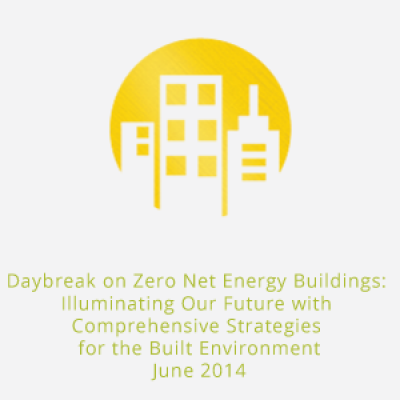
-
Newport, RI -
United States
Workshop Presentations
We have technology now to build and design zero net energy buildings. This meeting will address questions such as:
- How can all buildings move towards this as the norm,
- How can public policy pave the way towards zero net energy,
- Who are the stakeholders that need to be involved, and
- What are the technologies necessary to ensure success?
Workshop Objectives
- Review status of various programs and policies that are drivers towards Zero Net Energy
- Explore how public policies have helped or hindered the path towards Zero Net Energy
- Look at best practices using specific state examples
- Discuss the role the state agencies can play
- Recognize the opportunity public buildings present in becoming demonstration projects for new technology and the importance of engaging all stakeholders in the process (occupants, design team, and others).
- Describe the barriers and lessons learned to design and maintain a zero-net-energy building.
- Examine the role of analysis in understanding the potential for zero-net energy buildings.
|
Building Resiliency Today’s energy and climate realities require us to rethink how we build, produce power and utilize water. The net zero buildings of the near future will be dynamic in their function, with the capability to sustain vital operations in face of unpredictability. Responding to change and shifting priorities while reducing carbon emissions through durable, passive and renewable methodologies is fundamental in the design and implementation of resilient buildings and communities at all scales. In this section of the summit workshop we will explore building resiliency and regenerative design in relation to economic and climate variability, energy policy and beyond code initiatives.
|
|
Codes, Rating, and ZNE: Regulations that Drive Market Valuation of Energy Efficiency Energy codes and energy rating & disclosure are two of today’s most effective building energy policy levers that, if pulled together, could provide an even greater lift to future building energy efficiency. With cost-effective prescriptive code gains drying up as baselines rise, outcome-based codes are the logical next direction for maintaining our momentum towards zero-net energy buildings. However, building performance data must be made available so that realistic code targets can be set. Building energy rating and disclosure ordinances provide this data, and, unlike codes, facilitate long-term understanding and reduction of building energy consumption. These ratings will empower tenants and motivate owners to prioritize building energy efficiency, thereby cementing its value in the marketplace.
|
|
The Role of Finance in the Drive Toward Zero Net Buildings We know that the business case for net zero energy buildings is strong when considered on a lifecycle-cost basis. Yet, lack of capital is a commonly described obstacle in the pathway toward energy retrofits and net zero new construction. Recently, innovative mechanisms like on-bill financing and property assessed clean energy programs are providing a conduit for energy investment, but markets are hesitant to reach for deep energy savings because of its uncertain value. This workshop will explore the role that finance plays in the path toward zero net energy, considering the value of energy efficient construction as well as tools which might be used to bring capital to retrofit opportunities.
|
|
Take-Aways & Wrap-Up
|
